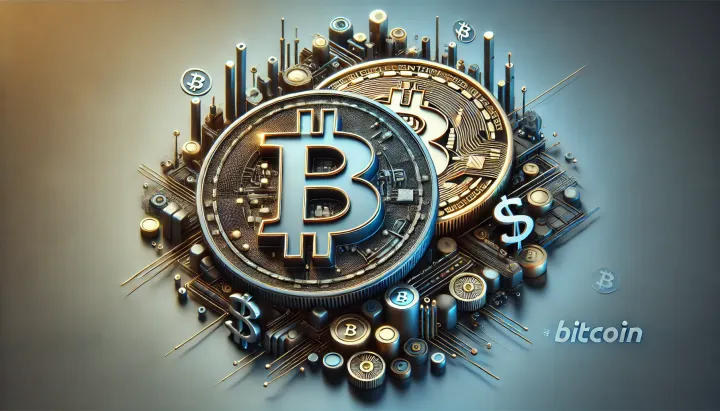Bitcoin: An Asset or the Future of Money?
The September 17, 2024 episode of The Bitcoin Layer centers on Nik Bhatia’s efforts to explain the intricacies of Bitcoin to Michael Howell, a liquidity expert. The discussion revolves around fundamental economic principles like Gresham's Law and Triffin's Dilemma and how these apply to Bitcoin.

Briefing Notes
My 'briefing notes' summarize the content of podcast episodes; they do not reflect my own views. If you have comments about this briefing note, please leave a comment below (requires signing up for a free blog subscription). Note that some of the podcast episodes I summarize may be sponsored: don't trust, verify, if the information you are looking for is to be used for decision-making.
Summary
The September 17, 2024 episode of The Bitcoin Layer, the first of a series with Michael Howell, delves into Bitcoin's dual role as both an asset and a form of money. Host Nik Bhatia and guest Michael Howell explore key economic principles like Gresham’s Law and Triffin’s Dilemma to assess Bitcoin’s potential impact on global financial systems. The conversation highlights Bitcoin’s volatility, its role as an inflation hedge, and its threat to traditional financial institutions. With its cryptographic foundation and decentralized model, Bitcoin presents both significant opportunities and challenges for the future of finance.
Take-Home Messages
- Bitcoin’s volatility is a challenge to its adoption as a currency, but it offers strong potential as a long-term inflation hedge.
- Bitcoin disrupts traditional banking models, removing the need for custodial services and creating a decentralized financial ecosystem.
- Bitcoin’s cryptographic security ensures its scarcity and value, positioning it as a reliable asset in a volatile global economy.
- Governments face the challenge of regulating Bitcoin while balancing privacy concerns and tax compliance, which could impact its broader adoption.
- Institutional adoption of Bitcoin is growing, with financial markets increasingly recognizing its potential as a macroeconomic asset.
Overview
In this episode, host Nik Bhatia takes liquidity expert Michael Howell through the fundamentals of Bitcoin. The discussion revolves around whether Bitcoin qualifies as an asset or a form of money, exploring key economic concepts like Gresham’s Law, Triffin’s Dilemma, and monetary inflation. Howell expresses skepticism about Bitcoin's volatility and its limited use in settling debts or taxes, while Bhatia emphasizes Bitcoin's decentralized nature and cryptographic foundation as key differentiators that elevate it above other assets and currencies.
The podcast breaks down three core principles of Bitcoin: it is an internet protocol, a form of property, and a type of money that does not require financial institutions. Bhatia explains that Bitcoin’s cryptographic foundation ensures its security, scarcity, and independence from central authorities. The discussion touches on Bitcoin's role as an inflation hedge, with comparisons to gold, and its potential to disrupt traditional banking systems by eliminating the need for custodial services.
Howell also raises concerns about Bitcoin’s volatility, noting that its price fluctuations pose a challenge to its broader use as money. However, both agree that Bitcoin’s potential to serve as a global macro asset is significant, particularly as a hedge against inflation. Bhatia emphasizes that Bitcoin’s decentralized structure enables it to function independently of governments, banks, and other traditional financial intermediaries, presenting a unique opportunity in the evolving global economy.
Stakeholder Perspectives
- Traditional Banks: Face disruption from Bitcoin’s ability to bypass custodial services, which threatens their role in managing assets and deposits.
- Institutional Investors: View Bitcoin as a potential hedge against inflation but are cautious due to its volatility and regulatory uncertainty.
- Governments: Could benefit from Bitcoin’s growth through tax revenue but are also concerned about potential tax evasion and the erosion of financial control.
- Retail Investors: Attracted to Bitcoin’s long-term value proposition, though concerns about price volatility and regulatory crackdowns remain.
- Technology Innovators: See Bitcoin’s decentralized, cryptographic structure as a foundation for new financial innovations that bypass traditional systems.
Implications
The rise of Bitcoin as both an asset and a form of money poses challenges to traditional financial systems, especially banks that depend on custodial services. If Bitcoin continues to grow, governments will need to find ways to regulate its use without stifling innovation. The potential for Bitcoin to replace gold as a long-term store of value is significant, particularly in the context of inflationary pressures on fiat currencies. As governments grapple with tax and privacy concerns, Bitcoin’s decentralized nature could become a focal point of financial regulation.
In the long term, Bitcoin’s cryptographic security ensures its scarcity and resilience, which positions it as a key player in global financial markets. However, its volatility may limit its use in everyday transactions unless financial instruments or policies are developed to mitigate this issue. As institutional investors and governments explore the integration of Bitcoin into existing frameworks, the balance between innovation and regulation will shape its future role in global finance.
Future Outlook
The future of Bitcoin hinges on its ability to balance volatility with utility. For Bitcoin to serve both as a medium of exchange and a store of value, it will need to address its price fluctuations, particularly in relation to traditional currencies and assets. If Bitcoin can achieve broader stability, it could become a central component of global financial systems, particularly in regions facing inflationary pressures.
Governments will play a pivotal role in Bitcoin’s future, particularly in how they choose to regulate its use. While regulatory measures may hinder adoption in some regions, the potential for Bitcoin to serve as a tool for financial innovation remains high. As institutions and individuals increasingly recognize Bitcoin’s value as a secure, decentralized asset, its long-term prospects appear promising, with opportunities to reshape the global financial landscape.
Information Gaps
- How can Bitcoin’s price volatility be mitigated to enhance its viability as both a medium of exchange and a store of value? Understanding how to reduce volatility is essential for Bitcoin’s future utility. Developing financial instruments or policies to stabilize its price could unlock broader adoption.
- What role can Bitcoin play within the framework of Triffin’s Dilemma, balancing the global demand for liquidity against its limited supply? As a finite asset, Bitcoin needs to navigate the global liquidity demands of fiat-based economies, requiring research into how it can coexist with traditional credit systems.
- How will traditional banking systems adapt to the rise of Bitcoin and decentralized finance, particularly in terms of custodial functions? Banks need to innovate as Bitcoin and decentralized finance reduce the need for custodial services, which are central to their business models.
- What regulatory frameworks can be implemented to balance the need for tax compliance with Bitcoin’s decentralized and private nature? Governments must find ways to regulate Bitcoin without infringing on user privacy, creating a need for research into policies that preserve financial autonomy while ensuring compliance.
- How can the cryptographic underpinnings of Bitcoin evolve to maintain security against future technological threats, including quantum computing? Bitcoin’s cryptographic security is key to its future, and ongoing advancements will be necessary to protect it from evolving technological threats like quantum computing.
Broader Implications
Bitcoin's Role in the Financial System
Bitcoin’s decentralized nature challenges traditional banking systems by reducing the need for custodial services. This shift toward self-custody in Bitcoin could lead to a broader movement in decentralized finance (DeFi), disrupting the core functions of banks, including deposit holding and payment processing. If Bitcoin continues to gain traction, financial institutions may need to adapt or face diminishing relevance in the asset management sector.
Regulatory Challenges and Global Adoption
Bitcoin’s potential to serve as both a store of value and a medium of exchange presents significant regulatory challenges. Governments will need to create frameworks that balance the protection of privacy with the need for tax compliance and financial stability. This could involve developing new tax systems or legal structures that accommodate decentralized assets while preventing tax evasion. The way different governments regulate Bitcoin will also influence its global adoption rates, creating regional differences in how Bitcoin is used.
Technological Evolution and Security
As Bitcoin continues to grow, its cryptographic foundations will face new technological challenges, particularly with the rise of quantum computing. While Bitcoin’s current cryptographic structure remains secure, future advances in computing could necessitate updates to its security algorithms. Maintaining the integrity of Bitcoin’s cryptography will be crucial to its long-term viability as a secure, decentralized asset.



Comments ()